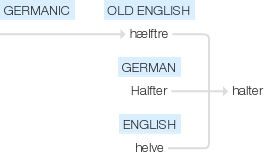Halter
Old English hælftre, of Germanic origin, meaning ‘something to hold things by’; related to German Halfter, also to helve.
wiktionary
From Middle English halter, helter, helfter, from Old English hælfter, hælftre(“halter”), from Proto-West Germanic *halftrijā(“harness”), from Proto-Indo-European *(s)kelH-(“to cut”), equivalent to half- + -ter. Cognate with Scots helter(“halter”), Dutch halfter, halster(“halter”), Low German halfter, helchter, halter(“halter”), German Halfter(“halter, holster”).
halt + -er
halter (plural halteres)
etymonline
halter (n.)
Old English hælfter "rope for leading a horse," from Proto-Germanic *halftra- "that by which something is held" (source also of Old Saxon haliftra "halter," Old High German halftra, Middle Dutch halfter), from suffixed form of PIE *kelp- "to hold, grasp" (see helve). Also "hangman's noose" (mid-15c.). In women's clothing sense, originally "strap attached to the top of a backless bodice and looped around the neck," 1935, later extended to the tops themselves.
